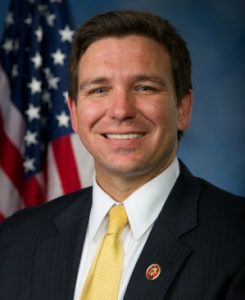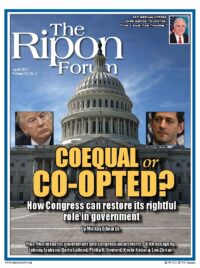
In an age of increasing political polarization, it is remarkable that proposals to impose term limits on members of Congress continue to command overwhelming support from the American people.
This is likely because Americans understand that our political system is dominated by a permanent political class composed in part by long-tenured members of Congress with an insatiable desire to be reelected. When members do retire from Congress, many of them stay in Washington to work on K Street as lobbyists or “consultants” to high-powered interests. The net result is a Congress that habitually fails to address the major issues facing the nation.
Term limits for members of Congress will change the incentives for members and pave the way for more effective government.
Accordingly, I have introduced a constitutional amendment to limit the terms of members of Congress to three terms in the House and two terms in the Senate. This is the same proposal that has been endorsed by President Donald Trump as part of his “drain the swamp agenda.” It has been supported by term limits grassroots advocacy groups, as well. This endorsement and support is based on three main factors.
Term limits for members of Congress will change the incentives for members and pave the way for more effective government.
First, term limits will make it easier for reformers to push new ideas, as members will be less bogged down by the inertia of doing things “the way we’ve always done them.” Fresh thinking will have a fighting chance when presented to members who are not entrenched in the ways of Washington.
Second, term limits will likely increase the role of merit in determining key spots such as committee chairmanships. As it stands, these posts are typically doled out based on a combination of seniority and a member’s fundraising totals on behalf of the party’s congressional campaign committee. Does anyone know or care whether James Madison, a member of the first Congress who authored the Bill of Rights, was a good fundraiser?
Third, term limits will make it more likely that members will take the political risks necessary to enact needed reforms. If a member only has a fixed number of terms to serve, that member will be less likely to be consumed by the desire to get reelected and more interested in accumulating tangible accomplishments during his or her short time in office.
It is sometimes said that term limits would reduce the level of expertise among members. But longevity in Congress can produce inside-the-Beltway tunnel vision that limits a member’s ability to produce effective legislation. What is more, there are millions of Americans who possess substantial expertise in key areas of policy who might be willing to serve in Congress if they knew they could make their mark without having to be in Congress for 20 years.
Another argument against term limits is that they serve to empower unelected congressional staff and K Street lobbyists and therefore reduce the power of Congress. But the staff and lobbyists already wield substantial authority, and there is a strong symbiotic relationship between the two (often times interchanging) groups. In addition, the rise of congressional careerism has coincided almost perfectly with the decline of Congress and the rise of the administrative state. It is hard to see how term limits could make this any worse.
Of course, the most common argument against term limits is that the American people can choose to remove officials come election time. While the idea that “every election is a term limit” makes sense in theory, in reality it ignores the undeniable fact that politicians design the electoral system to benefit themselves, conferring built-in advantages upon the incumbent class and limiting the ability of challengers to mount viable campaigns.
Term limits are not a cure-all for the American political system’s current ills, but they will help reorient the political incentives faced by lawmakers in a positive direction, which is sorely needed.
Ron DeSantis represents the Sixth District of Florida in the U.S. House of Representatives.




